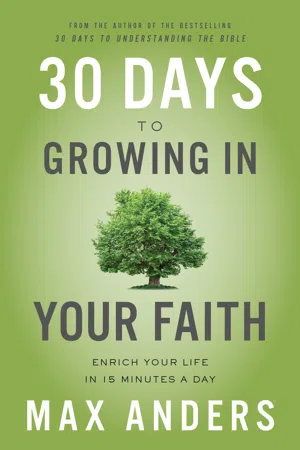
- 320 pages
- English
- ePUB (mobile friendly)
- Available on iOS & Android
About This Book
FROM THE AUTHOR OF THE BESTSELLER 30 DAYS TO UNDERSTANDING THE BIBLE.
Deepen your faith, strengthen your relationship with God, and enrich your life with this practical guide for spiritual growth.
In 30 Days to Growing in Your Faith, Max Anders uses a repetition and response methodology to outline a helpful framework for Christian living. To make a complex topic easier to grasp, this book is divided into three sections that reflect the basics of spiritual growth:
- KNOW: feed your mind with the truth
- BE: integrate your life with the lives of other solid Christians
- DO: get up each day and try your best to do what is true and right
Within each of these sections, Max outlines the most important things you need to know, using simple explanations and workbook-style learning to drive biblical truth into the hearts and minds of those who seek it. Themes like these will be addressed:
- Eternal perspective and purpose
- Desired attitudes, values, and behavior
- Responsibilities as followers of Christ
Insightful, engaging, and easy-to-use, 30 Days to Growing in Your Faith balances classic Christian teaching with innovative applications for today, giving you a solid foundation for a lifetime of growing in your faith. If you've been wondering how to engage with God's Word in your daily life, this is a must-read.
Frequently asked questions
Information
PART 1
KNOW

| You can’t believe something until you know it. |  |
CHAPTER 1
THE KEY TO HAPPINESS
 | CENTRAL PASSAGE: Matthew 22:37 ESV—“You shall love the Lord your God with all your heart and with all your soul and with all your mind.” |
1. It is okay for a Christian to want to be happy.
All men seek happiness. This is without exception. Whatever different means they employ, they all tend to this end. The cause of some going to war, and of others avoiding it, is the same desire in both, attended with different views. The will never takes the least step but to this object. This is the motive of every action of every man, even of those who hang themselves.1
If there lurks in most modern minds the notion that to desire our own good and earnestly to hope for the enjoyment of it is a bad thing, I submit that this notion . . . is no part of the Christian faith. Indeed, if we consider the unblushing promises of reward and the staggering nature of the rewards promised in the Gospels, it would seem that Our Lord finds our desires not too strong, but too weak. We are half-hearted creatures, fooling about with drink and sex and ambition when infinite joy is offered us, like an ignorant child who wants to go on making mud pies in a slum because he cannot imagine what is meant by the offer of a holiday at the sea. We are far too easily pleased.2
2. We naturally doubt that God alone is enough for our happiness.
And he said to the woman, “Indeed, has God said, ‘You shall not eat from any tree of the garden’?” The woman said to the serpent, “From the fruit of the trees of the garden we may eat; but from the fruit of the tree which is in the middle of the garden, God has said, ‘You shall not eat from it or touch it, or you will die.’ ” The serpent said to the woman, “You surely will not die! For God knows that in the day you eat from it your eyes will be opened, and you will be like God, knowing good and evil.” When the woman saw that the tree was good for food, and that it was a delight to the eyes, and that the tree was desirable to make one wise, she took from its fruit and ate. (Genesis 3:1–6, emphasis mine)
There was once in man a true happiness of which now remains to him only the mark and empty trace, which he in vain tries to fill from all his surroundings, seeking from things absent the help he does not obtain in things present[.] But these are all inadequate, because the infinite abyss can only be filled by an infinite and immutable object, that is to say, only by God Himself.3
3. We must seek our happiness in God.
Table of contents
- Cover Page
- Title Page
- Copyright Page
- Dedication
- Contents
- Three Reasons to Read This Book
- How Do You Live the Christian Life?
- Part 1: Know
- Part 2: Be
- Part 3: Do
- The Christian Life In a Thousand Words
- How to Have a Profitable Spiritual Focus Time
- Notes